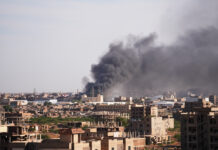Turkish media is reporting that Egypt is trying to turn public opinion against popular Turkish dramas aired in the Middle East.
According to Yeni Şafak English, the “High Fatwa Council” in Egypt published a statement accusing Turkey of trying to create an “area of influence” for itself in the Middle East via its soft power.
Citing globally-popular dramas such as “Resurrection: Ertuğrul” and “Valley of the Wolves,” it said that Turkish series should not be watched in any way whatsoever.
The statement also targeted Turkish President Recep Tayyip Erdoğan by alleging that he aims to revive the Ottoman Empire in the Middle East and regain sovereignty over Arab countries which were previously under Ottoman rule.
Egypt is closely allied with Saudi Arabia whose Dubai-based media group MBC (Middle East Broadcasting Center) decided to take Turkish series off air in 2018.
Analysts say that the main purpose is to diminish Turkey’s soft power in the region and undermine its credibility in the eyes of Arab nations.
Despite all these efforts, millions across Arab countries have still been watching Turkish series, especially online. Estimates show that TV series revenues will hit $1 billion in the year 2023.
Subscribe to our newsletter and stay updated on the latest news and updates from around the Muslim world!
Last November MBC started airing the big budget drama “Kingdoms of Fire” to “expose the tyranny of the Ottomans and their bloody history.”
Publicity for the show said it would highlight “Ottoman aggression against Arabs,” such as “their tyranny, entrenchment, criminality and theft of Arab history.”
The move followed a regional crisis in which Saudi Arabia and its allies imposed a blockade on Turkey’s regional ally Qatar. Turkish President Recep Tayyip Erdoğan dispatched emergency food supplies and troops to the country while committing to expanding Turkey’s military presence there.
Saudi also accuses Ankara of supporting the Muslim Brotherhood which Riyadh considers a terrorist organisation.
The Ottoman era in the history of Arabia lasted from 1517 to 1918. During that time the degree of Ottoman control varied with the fluctuating strength or weakness of the Empire’s central authority.
In the 16th century, the Ottomans added the Red Sea and Persian Gulf coast (the Hejaz, Asir and Al-Hasa) to the Empire and claimed sovereignty over the interior. The main reason was to thwart Portuguese attempts to attack the Red Sea (hence the Hejaz) and the Indian Ocean.
In the early 20th century the Saudis managed to force the Ottomans out with the help of the British.




















